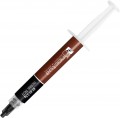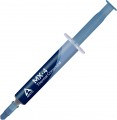Weight
Product net weight (without packaging). Knowing the amount of thermal paste in the packaging, you can estimate how much it will last.
Thermal conductivity
The fundamental indicator for pasta. The parameter determines the amount of heat passing through a unit of substance during a unit of time. The higher the thermal conductivity of thermal paste, the better. For home computer processors that do not get very hot, in principle, any thermal conductivity is suitable, but for high-performance gaming stations, it is advisable to give preference to compositions with high thermal conductivity (from 5 W / mK and more).
Viscosity
Thickness of thermal paste. The viscosity of the paste is considered to be optimal in the range of 160–450 poise. By eye, the consistency should be slightly thicker than that of hand cream or toothpaste. Too liquid thermal paste during operation can leak out under its own weight, too thick — it will not be able to fill the microcracks on the surface of the processor and heatsink as much as possible.
Operating temperature
A fork of operating temperatures at which thermal paste retains its properties. Usually, the upper ceiling of the operating temperature is up to +150 °C. There are substances with a wider temperature range of properties, but they are usually used for industrial purposes. The maximum temperature value often becomes important when overclocking the processor

